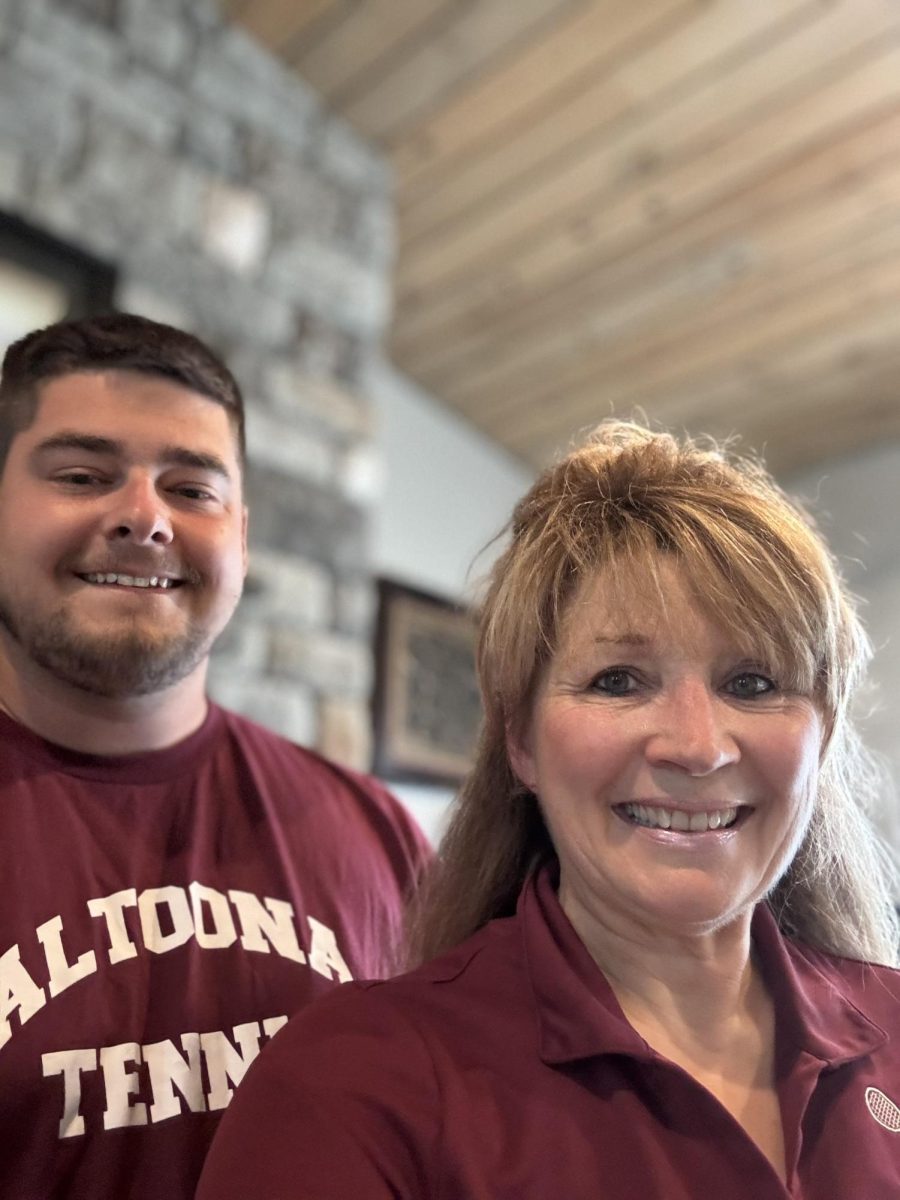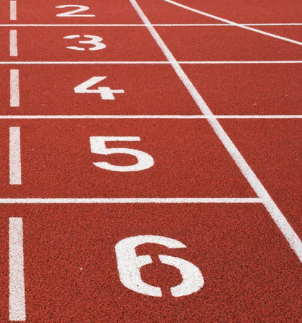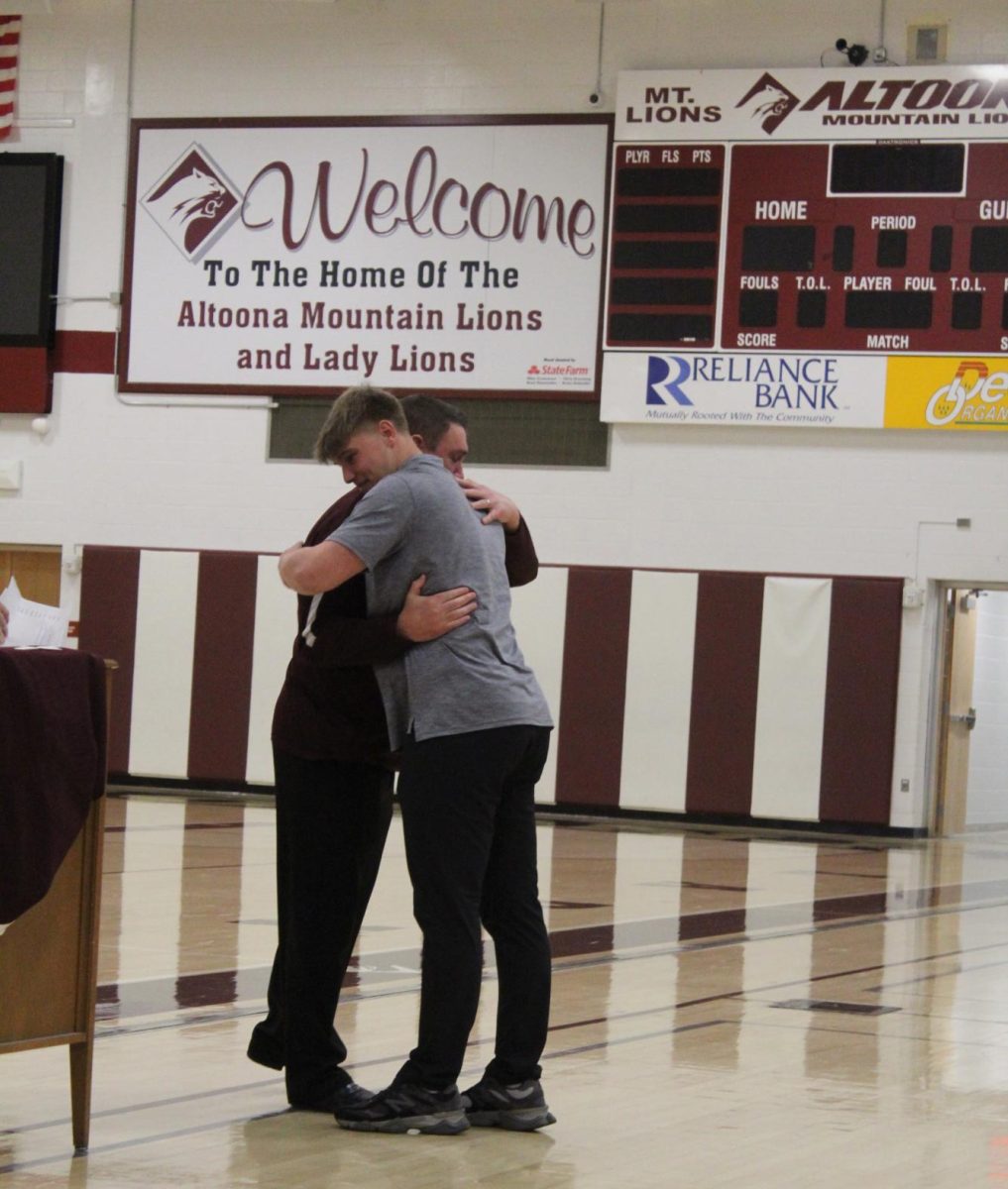Female athletes at the top of their game: managing school,sports success

Q: How long have you played that sport for?
A: “I have been running since I was five, but I started [cross country] in the summer before seventh grade.”
Q: How do you manage stress both as a student and as an athlete?
A: “I manage my stress by keeping a to-do list and working hard. It can be hard to manage it all, so it is important to make sure you are focused on everything that you are doing. When you are running, you need to make sure you are focused on running, but when you are working, make sure you are focused on working.”
Q: How do you find balance between schoolwork, sports and personal time?
A: “I have practice after school, so when I get home I try to get all of my work done. I have an allotted amount of time for personal time and homework. I use that to work ahead and study to help make sure that I don’t get overwhelmed. Because of the intensity of my sports I have to make sure I get plenty of sleep. I always give myself a half hour to read or scroll on my phone before bed.”
Q: What does it feel like to compete at a high school level, and how do you handle the pressure to perform well?
A: “It is a lot more intimidating to compete in high school because of the amount of talent that is in the grades nine-12. Sometimes, the pressure is really hard to manage, so making sure that I have a plan in place always helps. I like to write times on my arms to help me stay focused and on track. Before every race, we would make a circle and pray together, too. This helps us all get into the headspace where we need to be and be focused on what is coming up ahead.”
Q: How do you handle both wins and losses? How do you stay motivated after a tough loss?
A: “Loses are hard to handle sometimes. Wins are important to take humbly. There is always room for improvement. If I have a bad day, it is sometimes hard to realize that I can’t be at my best all of the time. It is okay to make mistakes, you just have to take the loss and learn from it. After a tough loss it is important for me to come back with that disappointment and use that to do better.”
Q: What are some of the biggest challenges you face when competing at the high school level?
A: “The biggest challenge is myself. Running is such a mental sport that you have to learn how to ignore negativity and speak positively to yourself. This can be hard, but the only thing that you are against is yourself. It’s your times against your times. If you can learn how to be obsessed and optimistic, then you can’t fail unless you quit.”
Q: Do you want to keep playing your sport after high school? If yes, what are your goals for your athletic future?
A: “I would like to continue running and swimming after high school. My plan is to run in college if I can and if it is the right option for me.”
Q: What advice would you give to other female student athletes who might be struggling with stress or balancing multiple responsibilities?
A: “I would say make sure you remember what is important. It is hard to be a girl in sports. People are very critical of women and their bodies in sports. Just remember that it is you against you. Never ever compare yourselves to others. Once I got into high school, I had to drop a couple activities so that I could pursue the things that made me happy. It is okay to not do it all. You don’t have to do all of the things to be successful. Focus on what’s important and make sure to be a student athlete and stay eligible.”

Q: How long have you played that sport for?
A: “I have played since I was about 6-years-old.”
Q: How do you manage stress both as a student and as an athlete?
A: “I try not to overwork myself in either aspect. I try to remember that school is more important.”
Q: How do you find balance between schoolwork, sports, and personal time?
A: “I manage the time I spend practicing and doing homework so I can get both done. I usually do my homework before I go to bed. I have personal time around practice time and days off.”
Q: What does it feel like to compete at a high school level, and how do you handle the pressure to perform well?
A: “It is a great feeling to compete at this level. The environment in the gym is always. I handle pressure by trying to stay humble and calm. This helps me to just focus on the game.”
Q: How do you handle both wins and losses? How do you stay motivated after a tough loss?
A: “After a tough loss I stay motivated by the idea that we have more practices and games. Wins are much more exciting. I like to have a good time but also stay humble.”
Q: What are some of the biggest challenges you face when competing at the high school level?
A: “A challenge is having practice or games everyday. It is physically draining. Another challenge is making up for school work when we leave early for games and get home late.”
Q: Do you want to keep playing your sport after high school? If yes, what are your goals for your athletic future?
A: “Yes, I want to play D1 college basketball. I hope to get a scholarship and go to college for free.”
Q: What advice would you give to other female student athletes who might be struggling with stress or balancing multiple responsibilities?
A: “I would tell them to put school first because you can’t play sports if you aren’t doing your part in school as well. I would tell them to make a routine or schedule.”
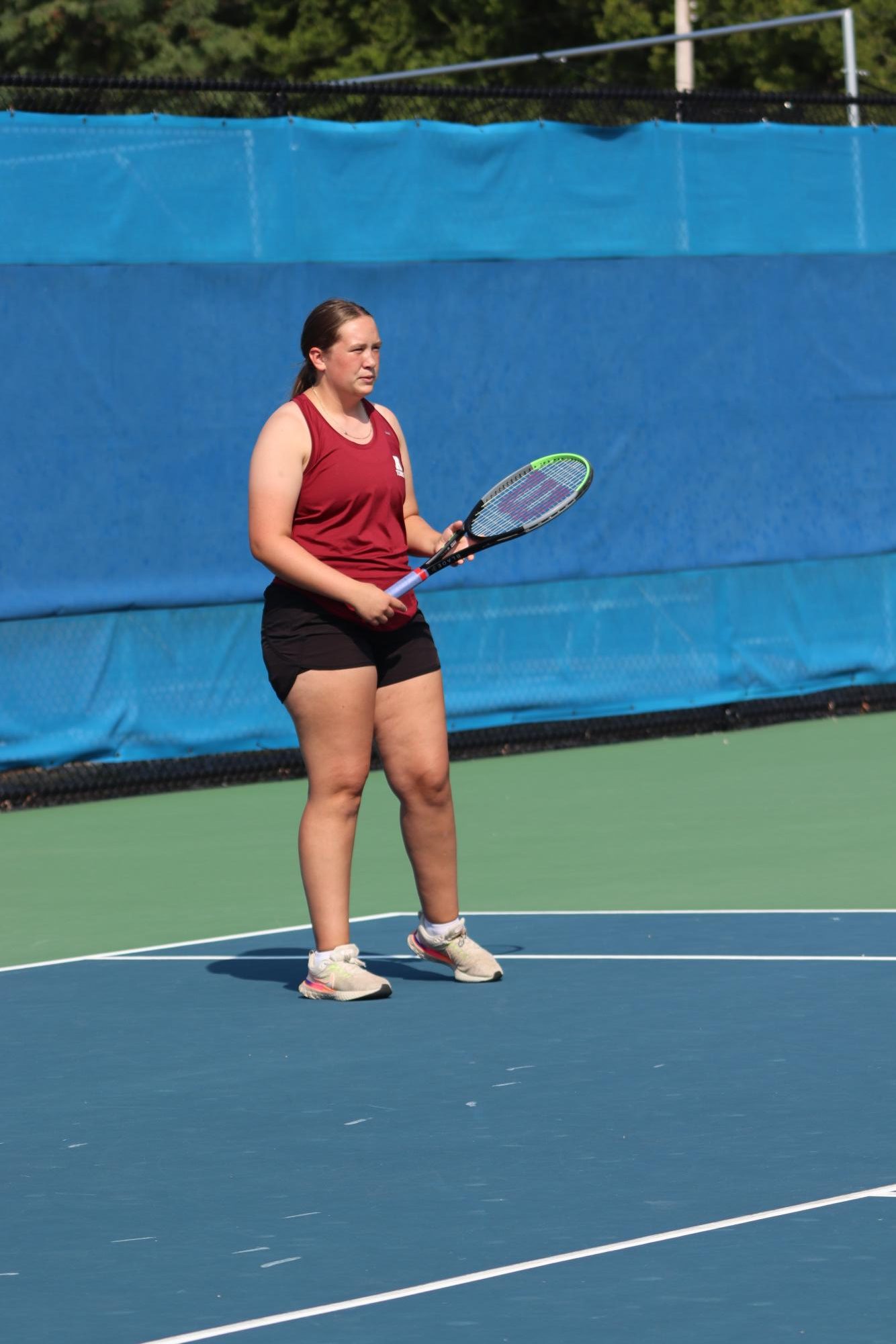
Q: How long have you played that sport for?
A: “I’ve played tennis for four years and softball for about 10 years.”
Q: How do you manage stress both as a student and as an athlete?
A: “I manage stress by prioritizing tasks, using time management techniques, and engaging in relaxing activities outside of academics and sports.”
Q: How do you find balance between schoolwork, sports, and personal time?
A: “I balance schoolwork, sports and personal time through careful scheduling, effective time management and setting realistic goals.”
Q: What does it feel like to compete at a high school level, and how do you handle the pressure to perform well?
A: “Competing at a high school level is challenging but rewarding and fun. The pressure to perform well motivates me to practice hard and focus on my goals. I handle pressure by focusing on what I can control and remembering that it’s okay to make mistakes.”
Q: How do you handle both wins and losses? How do you stay motivated after a tough loss?
A: “I view both wins and losses as learning experiences. After a tough loss, I analyze what went wrong, adjust my approach and use the experience to improve my performance. Staying motivated involves setting new goals and focusing on my progress.”
Q: What are some of the biggest challenges you face when competing at the high school level?
A: “Some of the biggest challenges are balancing academics and athletics, managing time effectively and dealing with the pressure of competition. But in the end I always find a way to overcome the challenges I have to face.”
Q: Do you want to keep playing your sport after high school? If yes, what are your goals for your athletic future?
A: “Yes, I want to keep playing sports after high school. My goals are to continue improving my skills, potentially playing at the collegiate level and enjoying the sport.”
Q: What advice would you give to other female student athletes who might be struggling with stress or balancing multiple responsibilities?
A: “My advice to other female student athletes is to prioritize self-care, seek support from teammates, coaches and family and remember that it’s okay to ask for help when needed. Time management and setting realistic goals are also crucial.”
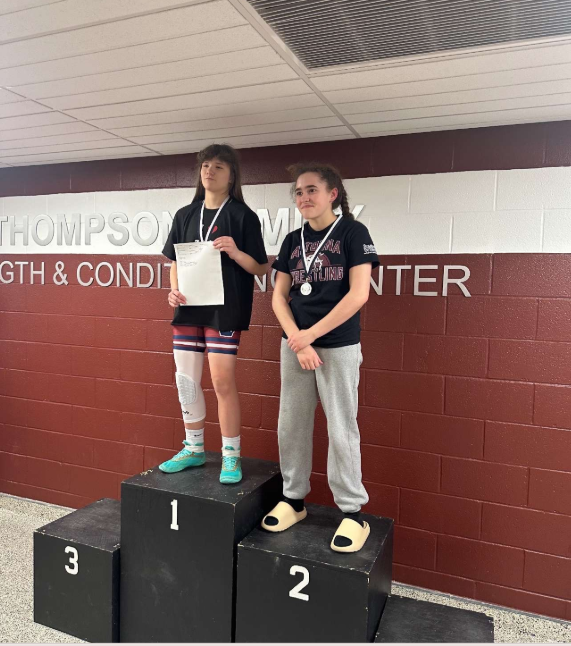
Q: How long have you played that sport for?
A: “I’ve played volleyball since I was nine, wrestled for two years and [ran] track for two years.”
Q: How do you manage stress both as a student and as an athlete?
A: “I pray and ask God to give me a sound mind.”
Q: How do you find balance between schoolwork, sports, and personal time?
A: “I honestly don’t get much homework, but whatever I am doing, I am present and staying present. If I’m at school I’m engaged, if I am at practice I stay focused on what we are learning and training in. When I am at home, I focus on spending time with my family.”
Q: What does it feel like to compete at a high school level, and how do you handle the pressure to perform well?
A: “Since I am only a freshman, I still do get nervous, but I feel like there isn’t much pressure to be amazing and the best athlete ever. We are just there to get better and to try my best. Just being focused on helping my team, and improving my performance.”
Q: How do you handle both wins and losses? How do you stay motivated after a tough loss?
A: “I look at my strengths and weaknesses in my performance, write it down, or make a mental note, and work on those things.”
Q: What are some of the biggest challenges you face when competing at the high school level?
A: “The competition for sure, and the fact that I can be going against kids four years older than me, or just people in general who are more experienced than me. I also feel jumping into high school practices is crazy, it’s always go, go, go, and it’s tough. Just always feeling busy but it’s great in the long run.”
Q: Do you want to keep playing your sport after high school? If yes, what are your goals for your athletic future?
A: “I honestly don’t know what sports I will be continuing and stopping. This year I feel like I was putting my foot in the water seeing what I like and don’t like, so we will see. I don’t know about college. I’m just going to listen to what God has in store for me, and go from there. I have many goals for my high school year, but not any for after high school.”
Q: What advice would you give to other female student athletes who might be struggling with stress or balancing multiple responsibilities?
A: “I would say a verse: “God has not given you a spirit of fear, but of power, love and a sound mind” [2 Timothy 1:7]. Know that you do not need to be afraid, because God has given us the authority to love and have power and peace in all we do.”
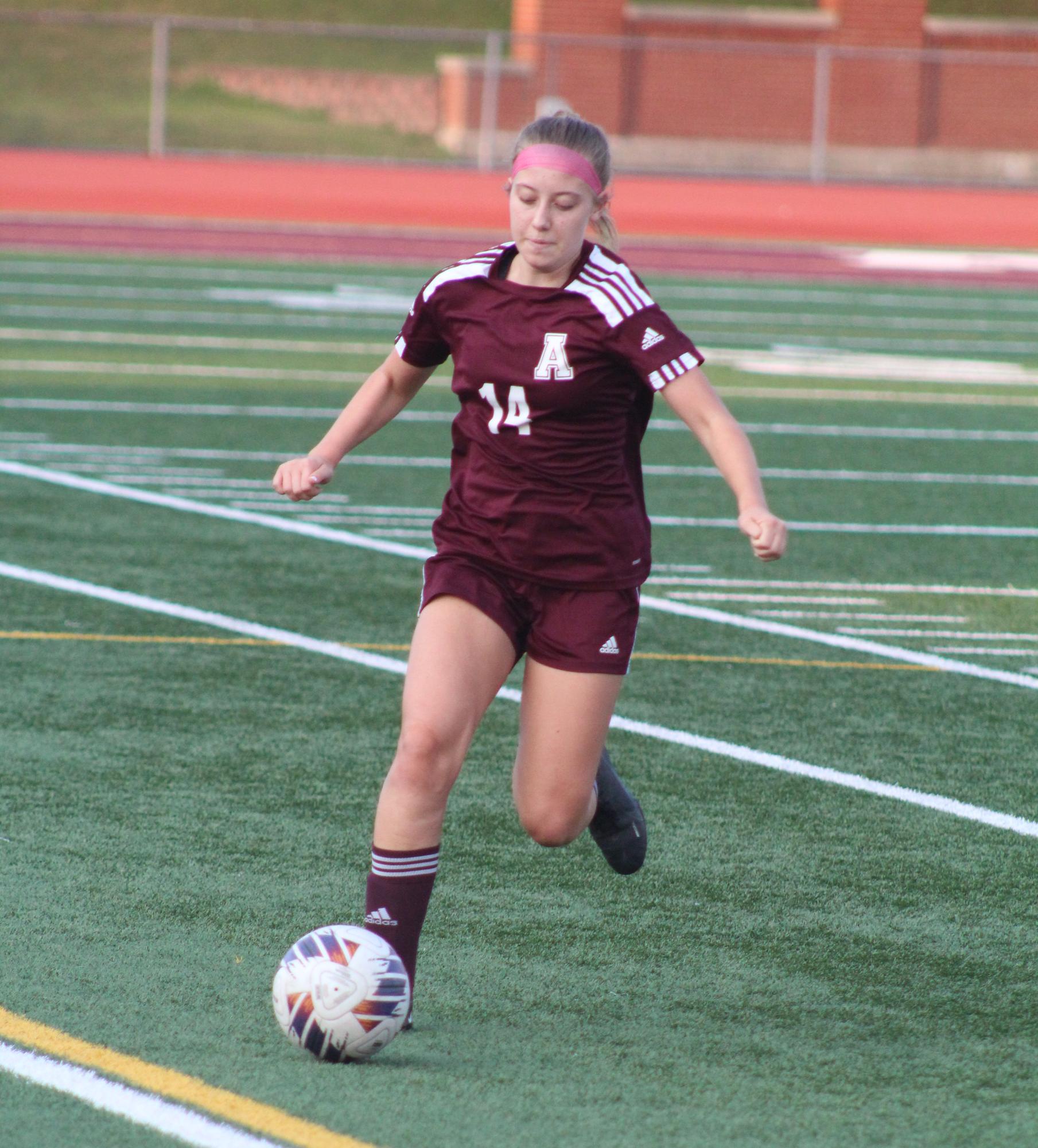
Q: How long have you played that sport for?
A: “I have been playing soccer since I was about 5-years-old.”
Q: How do you manage stress both as a student and as an athlete?
A: “I try to use my time wisely so that I don’t have too many things on my agenda pile up all at once, and definitely prioritize my sleep.”
Q: How do you find balance between schoolwork, sports, and personal time?
A: “Finding time for everything that I do can sometimes be a struggle, but if it’s something that is meaningful enough to me then I find a way to make it work. I struggle with procrastination, but I find that when I have a commitment, I see less of that procrastination in my life.”
Q: What does it feel like to compete at a high school level, and how do you handle the pressure to perform well?
A: “I’ve always felt pressure with sports, but the thing that helps me overcome that most is the love and support from my teammates. The soccer team is a family like no other, and they know just how to build up their teammates when they need it.”
Q: How do you handle both wins and losses? How do you stay motivated after a tough loss?
A: “You need to have losses in order to have wins. When our team went through a tough loss, we started by watching film and seeing what we could do better next time. Those mistakes motivate me to fix them in my next game.”
Q: What are some of the biggest challenges you face when competing at the high school level?
A: “My biggest challenge during the season was trying to understand that I was going to make mistakes and that it’s okay to make those mistakes.”
Q: Do you want to keep playing your sport after high school? If yes, what are your goals for your athletic future?
A: “Soccer is a big part of my life, and I will love it forever. I’m not sure yet if I want to continue playing at higher levels after highschool, but the possibility is still there.”
Q: What advice would you give to other female student athletes who might be struggling with stress or balancing multiple responsibilities?
A: “My advice to other female athletes would be to just stop and take a breath. The stress that you are going through right now will pass, even if it doesn’t always feel like it.”
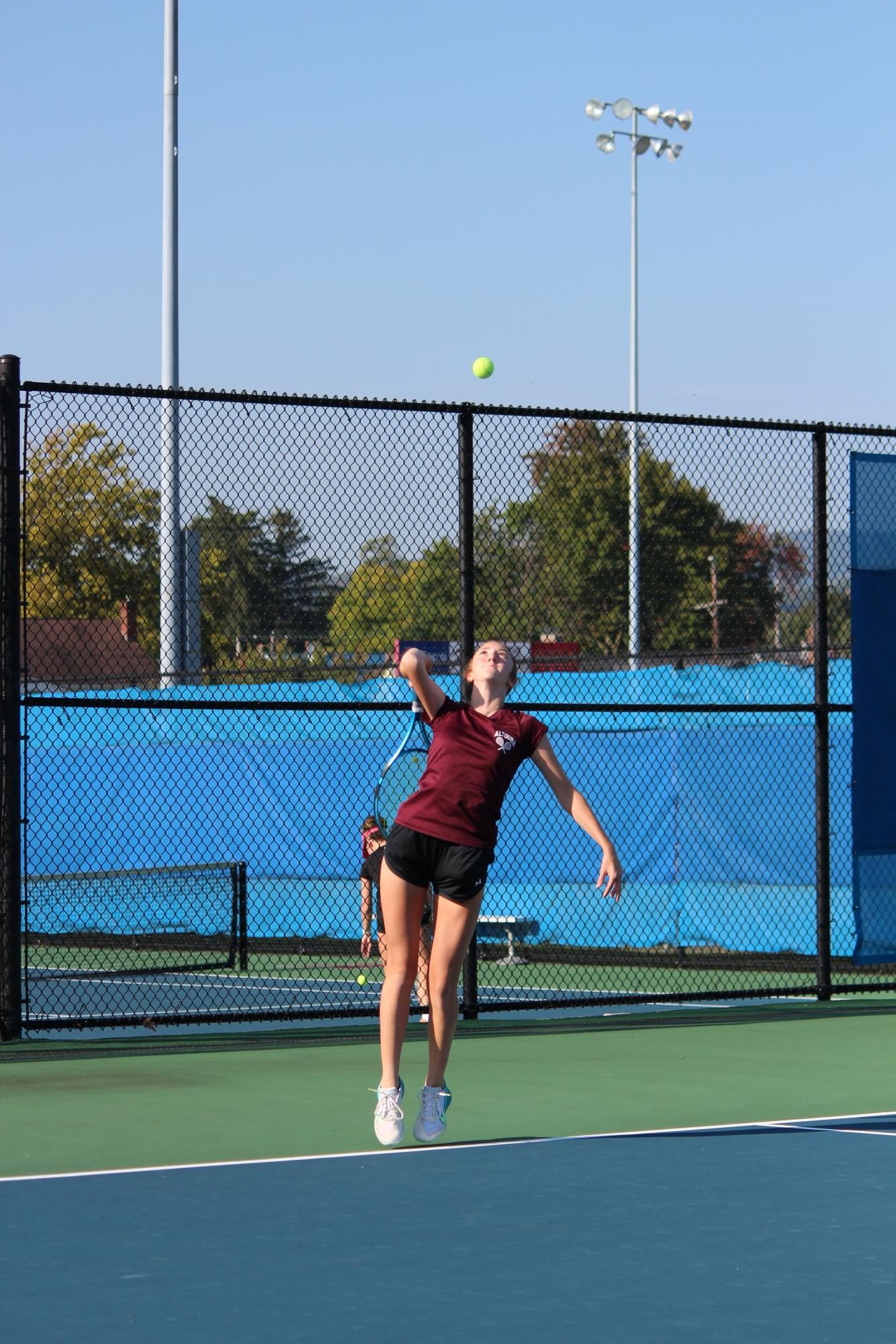
Q: How long have you played that sport for?
A: “I have been playing since I was little.”
Q: How do you manage stress both as a student and as an athlete?
A: “I try to manage stress in season by getting as much work done in school as possible.”
Q: How do you find balance between schoolwork, sports, and personal time?
A: “What I do not get done I make sure to turn in on time. I try to be productive so I have time to do things with my friends as well.”
Q: What does it feel like to compete at a high school level, and how do you handle the pressure to perform well?
A: “Although competing at a high school level can seem intimidating, I try to rely on all of the practice and work I have done for my sport. When I win, I feel my work has paid off.”
Q: How do you handle both wins and losses? How do you stay motivated after a tough loss?
A: “When I lose, it is definitely hard, but my teammates help me shake it off for the next match.”
Q: What are some of the biggest challenges you face when competing at the high school level?
A: “It is harder competing against girls much older than me.”
Q: Do you want to keep playing your sport after high school? If yes, what are your goals for your athletic future?
A: “I can definitely see myself playing tennis past high school because most of my family plays as well.”
Q: What advice would you give to other female student athletes who might be struggling with stress or balancing multiple responsibilities?
A: “I would tell other female student athletes to try to manage their time well. Even though I struggle with time management, I know it is crucial for success in school and in your sport.”

Q: How long have you played that sport for?
A: “16 years.”
Q: How do you manage stress both as a student and as an athlete?
A: “School comes before sports always. I try to keep my grades up so then I also do well in sports helps make a balance.”
Q: How do you find balance between schoolwork, sports, and personal time?
A: “You have to make a schedule that works for you, making time in between events and just work through it.”
Q: What does it feel like to compete at a high school level, and how do you handle the pressure to perform well?
A: “Competing my whole life then joining a high school team there is definitely more pressure not to let anyone down but you just have to do the best you can.”
Q: How do you handle both wins and losses? How do you stay motivated after a tough loss?
A: “The high school gymnastics team didn’t lose at all this year, we are two-time state champs and undefeated, but if we would have had a loss you work more and just do your best.”
Q: What are some of the biggest challenges you face when competing at the high school level?
A: “The challenges I faced were being on two teams and getting injured mid-season and having to take a couple meets and practices off to heal.”
Q: Do you want to keep playing your sport after high school? If yes, what are your goals for your athletic future?
A: “No, I am not continuing on in my sport. This was my last year.”
Q: What advice would you give to other female student athletes who might be struggling with stress or balancing multiple responsibilities?
A: “School always comes first, you have to take the time to find a balance along with mental health. It can be a lot, take a break if needed, everything falls into place and always works out, give it time if it needs it.”
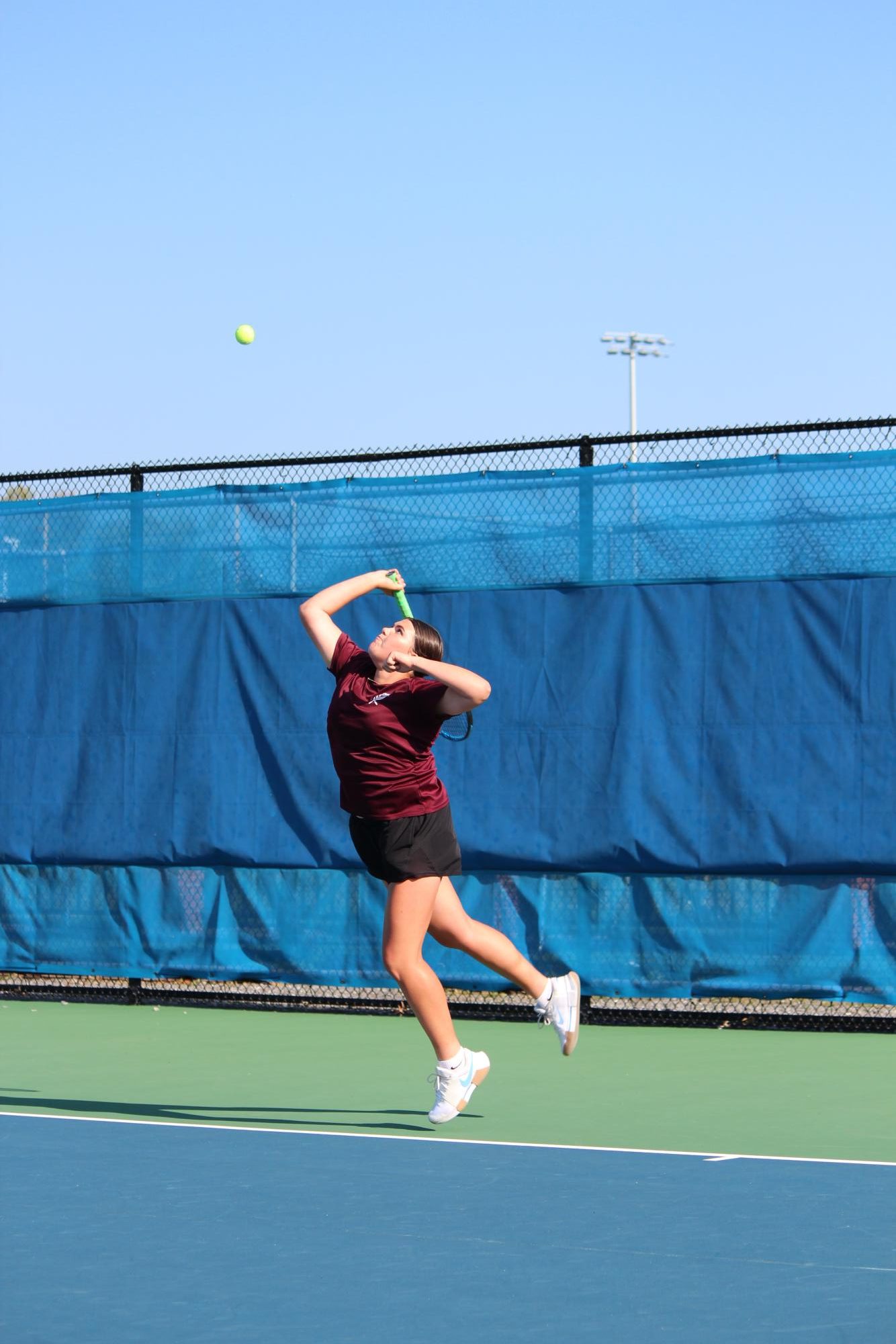
Q: How long have you played that sport for?
A: “I’ve always been around it since my dad is a coach, but I started taking private lessons about two years ago.”
Q: How do you manage stress both as a student and as an athlete?
A: “I always make sure to check up on myself and give myself days to relax and get caught up with stuff.”
Q: How do you find balance between schoolwork, sports, and personal time?
A: “I never let myself give all my time to either sports or school, and instead just find an equal middle with them.”
Q: What does it feel like to compete at a high school level, and how do you handle the pressure to perform well?
A: “Honestly, competing at the high school level can be really nerve-wracking. I always just remind myself to have fun because at the end of the day, it’s about enjoying the sport.”
Q: How do you handle both wins and losses? How do you stay motivated after a tough loss?
A: “I’m always super proud of myself and my team after a win. After a loss, it hurts, but I use it as motivation to work harder. I remind myself that it’s just one match, and I’ll do better next time.”
Q: What are some of the biggest challenges you face when competing at the high school level?
A: “There’s a lot of pressure to perform, and sometimes it feels like you have to be good at everything.”
Q: Do you want to keep playing your sport after high school? If yes, what are your goals for your athletic future?
A: “ If there is an opportunity to play tennis in college I would take it. The academic side is my priority when deciding on a school though.”
Q: What advice would you give to other female student athletes who might be struggling with stress or balancing multiple responsibilities?
A: “I would say don’t compare yourself to others. Just because someone else is succeeding doesn’t mean you’re failing. Everyone moves at their own pace, and success looks different for everyone.”



